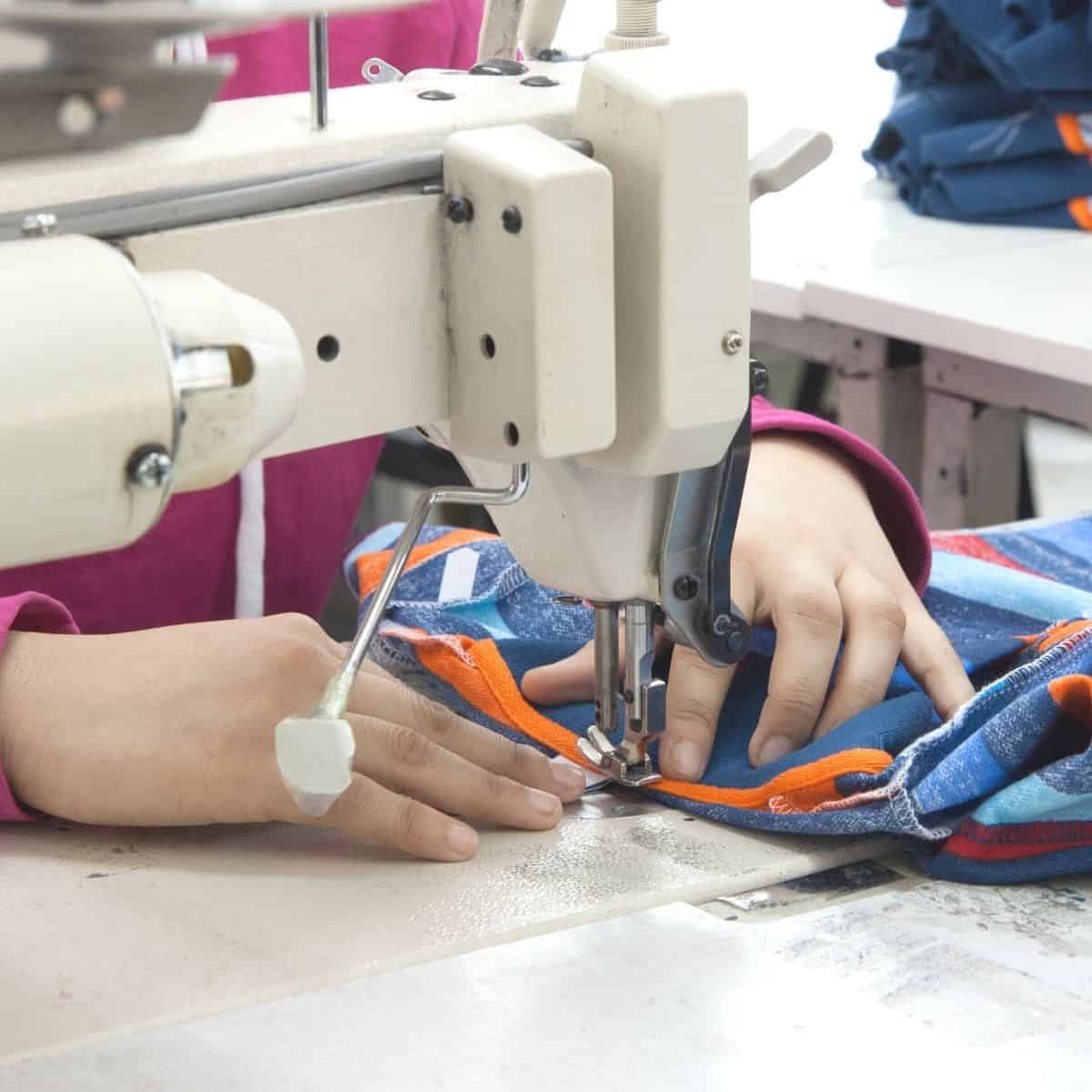Biblical Principles of Sustainability in Fashion include the stewarding the earth, loving others from afar, and being wise with your money.

Sustainability is a huge buzz word across the board, and ethical fashion is a big deal, but what do those things really mean? Are they relevant to us as Christians? You bet they are. God has a lot to say about how we consume and use things and how those impact the world around us. I’m sharing three areas in which sustainability is a big deal for the Christian woman.
Hello, gorgeous. I am so excited today to be talking about something that is a buzzword in the fashion industry, but I want to break it down from a biblical perspective today and look at it from a conservative Christian viewpoint. So let’s talk sustainability.
When we talk about sustainability, it often brings up conversations about climate change and different ideologies get mixed in together. I’m specifically talking about sustainability when it comes to fashion and style and how it affects you and other people, and what God commands us regarding this area.
Sustainability in your wardrobe is a process; it’s not a one-and-done thing because sustainability encompasses a lot of areas This is not a practical look at how to practice sustainability, rather I want to focus on the biblical basis for sustainability.
I used to buy a ton of fast fashion. I was constantly looking for the next best perfect thing to go in my wardrobe. Then I went through a period where I embraced merino wool and natural fibers.
In 2021 I completed the 100-day dress challenge, and it got me thinking about sustainability in our fabrics, wardrobe, and style, and how this applies to our lives. God led me on this journey, and I’ll be honest with you, this episode was completely his idea, brainstormed in a prayer session.
I sat on it for a little while, and I’m finally bringing it to you because I feel like God has something to say to us about how we consume and how we use things and how that impacts the world and the environment, and our own selves in our own values and our faith. I’m sharing three overall areas in which we need to consider sustainability from God’s perspective.
join the style membership for fashion frustrated women
The Radiant Woman Adventure
Understand your personal style, choose clothes that flatter your body, and look amazing every day. Get help with color analysis, style essence, body type, and building an easy simplified closet with a personal stylist in your pocket.
Table of Contents
Biblical Principle #1: The Environment and Dominion
The first area that I want to touch on is the environmental perspective and impact of fast fashion and sustainable practices. In Genesis 1:26, God says, Let us make man in our image according to our likeness, and let them rule over the fish of the sea and over the birds of the sky. And over the cattle over all the earth and over every creeping thing that creeps on the Earth.
So God creates us, and one of the first things he does is gives us dominion over the Earth and the environment, he puts this responsibility into our hands to care for these things. We can talk about our broken world and how sin has entered the world since the fall. Regardless, we still have that responsibility to make good choices and to care for those things that He’s entrusted to us.
The reality is that conventional fashion manufacturing from farm to your closet is anything but sustainable. There are players in the fashion industry that are using sustainable practices, and you’ll usually notice this by the price tag on those clothes.
I want to illustrate two different areas in fashion manufacturing where this is a problem for the environment and the earth. I’m going to be using cotton for the rest of these examples.
Many times we think that because cotton is a natural fiber, it’s better for the environment and our wardrobe. While it can be true that it’s better for your wardrobe, conventional cotton is anything but great for the environment. Conventional cotton takes a ton of water to grow, it’s terrible for the soil, there are a ton of chemicals that go into it. t
There are organic cotton farms in America that are doing things a better way. Cotton overall has a bad reputation for being a destructive crop historically for our nation in regards to slavery, and now we’re talking about it from an environmental perspective.
Misusing our resources in the production of cotton is definitely not being a good steward of the earth. Every time you as a consumer buying and support these practices, you are contributing to this overall degradation of the Earth, including our water supply and the ground.
Now, this is just the beginning of the manufacturing process. This is where we get the fibers that we’re using to create the clothing. Let’s jump way ahead to the future of these garments and let’s look at it from a disposal perspective.
I’m guessing that when you get tired of your clothes, many of you pack them up and take them to a donation center. Whether it’s a goodwill or our local charity, we donate our things thinking that they’re going to be recycled.
We expect them to be and put back into the community and re-used in a way that makes us feel like we’re making a sustainable choice. However, that’s far from the truth. The reality is, the majority of the garments that we donate are deemed unusable and are not recycled into our local communities or even our regional communities, so let me share what actually happens.
Your unusable discarded clothes go through different processes; they get sorted in multiple different ways, and some of them are recycled. The best option here is that some of them may get turned into recycled material to use in other things like cleaning rags or things you wouldn’t wear.
The majority of them, (especially things that are synthetic fibers that don’t hold up well and can’t really be recycled), get put into these ginormous cubes, basically massive Ziploc bags. These are generally about the size of a mid-size sedan, so a rather large tub.
These get shipped overseas, generally to Africa, and they get deposited on the shores over there. There are images showing how their beaches are littered with these cubes of American unusable clothing.
Not only is this bad for the environment because we’re dumping this stuff, but it’s also bad for these local industries in these developing countries. The hand artisans that make traditional clothes are no longer making them because everyone is finding what they need in our discards.
From the beginning of the manufacturing all the way to the disposal process, the process doesn’t allow us to be a good steward if we don’t know what we’re dealing with. If we’re buying fast fashion off the rack and disposing of it two months later because it’s outlived it’s usefulness or it’s no longer in style, we’re really just contributing to this problem.
By buying more, we’re telling the fashion industry we need more, and so they’re making more. They’re using more water, and a lot of other terrible things we’re gonna touch on. You’re feeding the process of using more, consuming more and not being sustainable.
Even when you think that your donation is going to be a good thing, I encourage you to look at the company that you’re donating to. Look at their practices, ask them, email them if you want to find out what they’re doing with those clothes. Find out if they’re recycling them: if they’re putting him into a recycling program that actually does what they are promising, or if they send them to a company that packages tubs and ships them overseas.
Knowledge is power.

Biblical Principle #2: Love Others as Yourself
Let’s talk about the second area where sustainability is really impacted by God’s word. In Matthew 22 Jesus is teaching and they’re asking him, What’s the greatest command? He says, You shall love the Lord your God with all your heart, and with all your soul, and with all your mind. (v. 37)
Number one, love God, it’s the first commandment. This is the great and foremost commandment. The the second is like it. You shall love your neighbor as yourself. On these two commandments depend the whole Law and the Prophets. (v. 38-39).
Being unsustainable in our fashion choices influences our ability to love others, even others we don’t know and don’t see.
Building off our earlier example of cotton manufacturing, We’re gonna talk about jeans here a little bit, and most jeans (denim) are made out of cotton. This is one of the largest use areas of cotton is the manufacturing of denim. This process is one of the worst processes in fashion manufacturing that you can find.
We talked about cotton being such a water heavy crop and how much it consumes. Once that cotton is picked and turned into fibers, it frequently goes into denim production. I believe statistically jeans are the highest usage of cotton products around world.
We all love our blue jeans, right?
Theres another process in denim manufacturing that’s really damaging, both to the environment and to people. Much of the of manufacturing of jeans happens in China, Vietnam and India, where they don’t have the restrictions that we have in the US.
Dying jeans blue was once done with Indigo, a natural occurring dye from plants, but Indigo is more expensive and more time-consuming. Over time, the manufacturing of genes has began done with chemicals and chemical dye. The problem here is that the chemicals found in those dyes are often cadmium, lead and a few others, all of which have been classified by the World Health Organization as highly damaging.
The clothing manufacturers in these countries with very little regulations throw jeans into a vat of water, an obscene amount of water. Then they put in chemicals that are unhealthy for workers and environment. When they are done they dump these chemicals into the water supply.
So every time you buy jeans, you’re not loving others because of the process those jeans went to to get to your home. I know that most of you are not going to give up your genes, and so just be aware that buying denim brand new contributes to this problem.
It’s definitely harming people in other countries that are making these jeans. This is really just a small piece of the problem. I do encourage you to do more research that you can see for yourself all the really deep insights and the things that go on.
You can buy your jeans second hand. They still go through the same process, but at least they’re being recycled. There are companies making genes from organically grown cotton and indigo in factories with good work conditions, but they will cost you more.
Onto the second part of loving others. Once upon a time, America was a great contributor and producer of fashion. That has long since gone out of play as pricing has driven outsourcing to other countries, again, with low regulations.
In some of countries, there have been terrible catastrophes. These manufacturing plants don’t have adequate ventilation, and they don’t have adequate protection for these chemicals they are dealing with. These tragedies occurred because of our need and compulsion for fast fashion all the time.
Think about how you can reduce this. How can you reduce your purchases that hurt other people in their processing and manufacturing? What can you do? Pray about it. Ask God what can you do to reduce your own individual impact so you can say, “I’m doing my best not to harm other people that I’ve never met by buying fashion that was created at their expense.”

Biblical Principle #3: You Cannot Love God and Money
The final area that I’m going touch on here is our own individual spiritual journey when it comes to sustainability. God is really clear about what we should be focused on: it’s supposed to be Him at the expense of all others.
Shopping and fashion can be its own idol. Pulling a verse out of context here from Jonah 2:8, Those who regard vain idols forsake their faithfulness.
What is clothing anyway? Clothing is a way that we communicate with the outside world. But the fashion industry has become such a huge beast, constantly telling you that you need the latest and greatest and newest and most trendy things to keep up, look younger, and be accepted.
These are all false messages that they send us. But when you allow those messages to take root inside you and become what you believe about how you look, you are definitely making an idol out of your fashion and your appearance.
We are not respecting that God asked us to put Him first when we’re putting so much effort and energy into how we look.
It may seem shocking that an image consultant is telling you not to care about how you look, but that’s not what I’m saying at all. We are commanded to be stewards of our body, and this does include the clothing that we wear and how we present ourselves.
But right now I’m talking about shopping just to shop, and shopping as a hobby. Collecting clothes as a way to make yourself feel better, as a way to numb some of the difficulties we face in life, because shopping gives you some incredible endorphins.
It’s these kinds of things I’m talking about. Instead of focusing our energy on God and what He wants for us and what He’s called us to, and how He wants to look… you listen to the world and what they’re saying. Stop doing what your flesh wants to do, using shopping days to feel good and making it an idol.
Finally, let’s talk our responsibility to be sustainable with the wealth that God grants to us.
He who is faithful in a very little thing is faithful also in much; and he who is unrighteous in a very little thing is unrighteous also in much. Therefore if you have not been faithful in the use of unrighteous wealth, who will entrust the true riches to you? And if you have not been faithful in the use of that which is another’s, who will give you that which is your own? No servant can serve two masters; for either he will hate the one and love the other, or else he will be devoted to one and despise the other. You cannot serve God and wealth” (Luke 16:10-13).
What exactly does this have to do with sustainability, fashion and God’s view on all of this?
Well, clothes cost money. Even if you’re thrifting they still cost money. If you’re going on buying sprees on a regular basis, you are not being responsible with the well that God has entrusted to you.
You don’t need a thousand or multi-thousand dollar closet. You don’t need a new outfit every time you go somewhere, and you don’t need a new wardrobe every three months.
You don’t need any of those things. You need a solid wardrobe that suits your coloring, body type, and lifestyle. One that functions to get you moving forward doing the things God has called you to and meet society’s expectation of being clothed.
You don’t need a new stuff all the time, you don’t need to be trendy, you don’t need to please other people. You don’t need to do any of these things, you need to be authentically you.
You need to be clothed, and you need to listen to what God has to say about what He wants for you, because if you ask Him, He will tell you. There are some great passages in the Bible about how women are to look and our perspective on our looks and our vanity.
For now I want you to start thinking about sustainability from a biblical perspective. What does God think about the way we consume fashion? What does He think about the way we put our image and looks on a pedestal above other more important things that he’s asked of us?
What resources has He given you; what wealth in different areas have you been given that you need to focus on being a better steward of? What practices can you change in your consumption to do a better job of fostering stewardship of the earth like buying from companies that are committed to ethical and sustainable practices?
Pray Psalm 139: 23-24 out loud: Search me, O God, and know my heart. Try me and know my anxious thoughts. And see if there be any hurtful way in me and lead me in the everlasting way.
Final Thoughts on Biblical Principles of Sustainability in Fashion
You may not have ever considered how your consumption of fashion and your approach to style and image has an impact on your faith. But it really does. And the thing is, it’s not your fault. It’s the fashion industry and the way it’s grown and constructed, but if you don’t know about these things, you can’t make better choices.
The reality is, most people don’t know about these things. These are the hidden dirty under side of fashion, but God asked me to bring them to you. So here I am, telling you that blue jeans are cancer pants and other crazy things.
If you’re mind blown and want to dig deeper, here are three fantastic resources that gave me my information.
- Fashionopolis by Dana Thomas
- Unraveled by Maxine Redat
- Overdressed by Elizabeth Cline
What I would love for you to do is choose one of these areas, whether it’s environmental stewardship, loving others, or your own heart work. I challenge you to dig in and pray on this, seek God’s will, dig into the word, see what changes He wants you to make.
I have really enjoyed sharing this, this is such a topic that is near and dear to my heart. The more I learn, the more disgusted I get with how damaging the conventional fashion industry is across the board.
My prayer for today is that you would allow God to change your thinking about fashion, about image, about your own style, and let Him renew His Word in your mind and transform your thoughts and expectations about how we look.
Related Articles on Biblical Beauty
Discover 3 areas of biblical sustainability in fashion straight from the Bible.
Stacey is the owner and creator behind Radiantly Dressed. She is a certified image consultant and AICI member focusing on creating simplicity in wardrobes via color and style.




















Biblical principles of sustainability in fashion involve recognizing the value of all creation and using resources responsibly, respecting human dignity and promoting fair trade practices, and practicing good stewardship of the environment. This includes reducing waste, using eco-friendly materials, supporting local communities, and advocating for social justice. By adopting these principles, fashion can be a force for positive change in the world, promoting sustainable and ethical practices while respecting God’s creation.
Your insights into fair labor practices resonate deeply. In a world driven by fast fashion, the call to honor the dignity and rights of those involved in the production process is a powerful reminder that true beauty in fashion goes beyond aesthetics.
As we navigate the ever-evolving landscape of style, your blog serves as a guiding light, urging us to consider the impact of our choices on the world around us. It’s a testament to the idea that fashion can be a force for positive change, embodying values that endure through time.